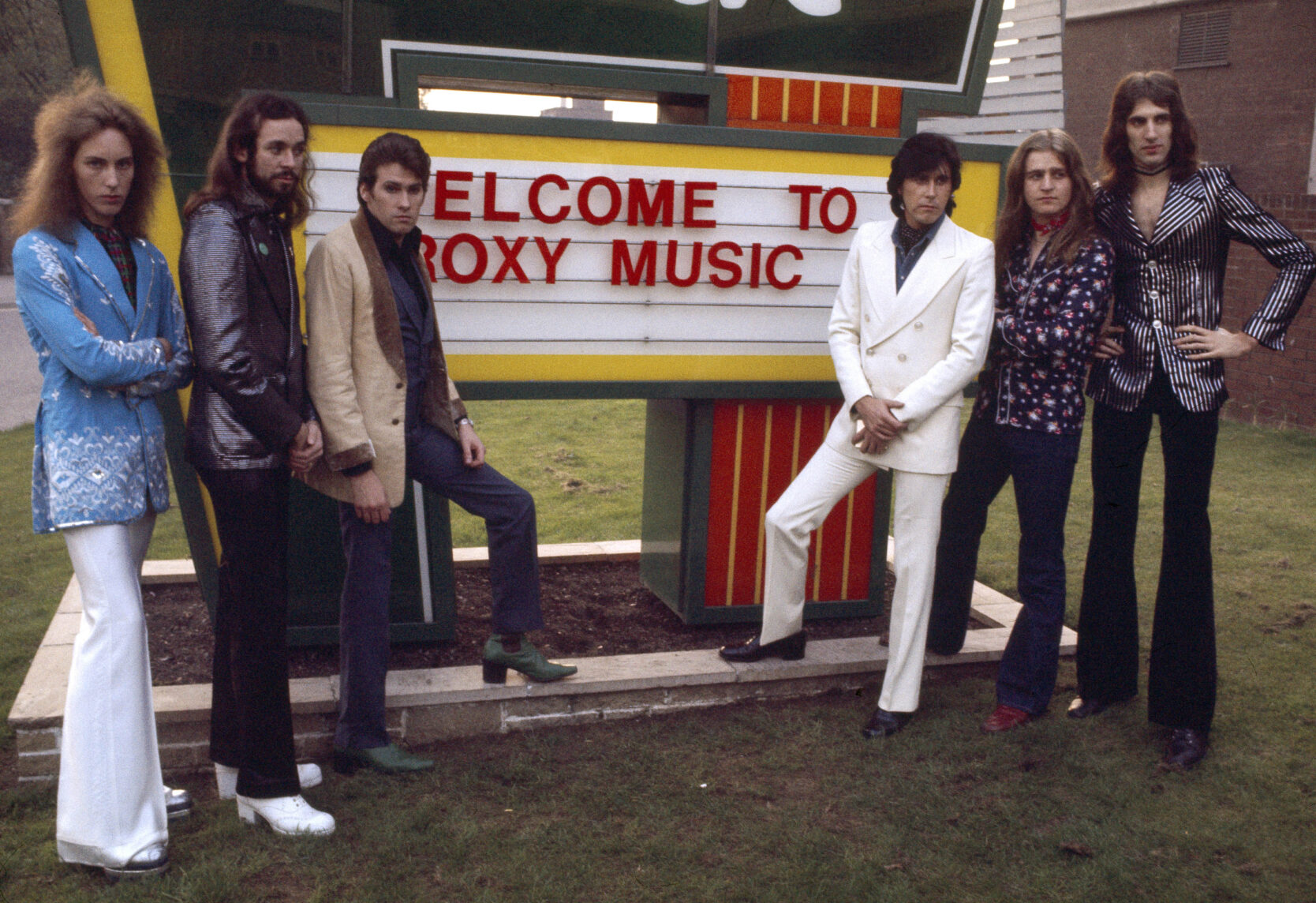Roxy Music gave us Bryan Ferry and Brian Eno, influenced punk and new wave, and charmed a legion of musicians with their sonic collage art: David Bowie, Chic, Grace Jones, Sex Pistols, U2, Duran Duran, Siouxie and the Banshees, Radiohead, Scissor Sisters, Franz Ferdinand, and more.
So why the hell did it take decades for Roxy Music to get their due? Apparently, art schoolers with an unabashed love of animal print, cinema and eyeshadow were “remarkably inaccessible” for the gatekeepers of rock canon, a scourge that delayed Roxy Music’s induction into the Rock & Roll Hall of Fame until 2019.
Now that Roxy Music are reuniting to celebrate their 50th anniversary, it’s the perfect time to get (re)acquainted with their deluxe and delightful catalog. Crooner and keyboardist Ferry, guitarist Phil Manzanera, oboe and sax savant Andy Mackay, and original drummer Paul Thompson will once again take the stage on tour, though production wizard Eno will be missed.
From 1972 to 1982, Roxy Music demonstrated a mastery of glam rock, experimental music and sophisti-pop, dabbling in doo-wop pastiche, country licks, medieval fare, disco and more genres along the way. While this is an album ranking per se, there are no real monstrosities in Roxy’s discography—even their releases with room for improvement take worthwhile risks that make for a riveting listen today.
8. Manifesto (1979)
Roxy Music took a brief hiatus in the late ’70s for some much-needed R&R and solo projects. Manifesto, their returning to the scene in 1979, is very much a transitional album, wading through both punk and new wave without the confidence of their earlier work nor final albums. While Roxy’s glitter-smeared cacophony informed both the Sex Pistols and The Clash, their reaction to the very punk movement they bore is far more muddled, never quite reaching the thunderous heights Ferry and co. are capable of.
On the plus side, Manifesto fortified the band’s impact on new wave: single “Trash” became a club anthem, and Roxy fans from Duran Duran to The Human League would soon find their own success. Manifesto truly shines when Roxy genuinely have fun: “Still Falls the Rain” and “Cry, Cry, Cry” deliver enough pep in your step to keep you on the ballroom floor until the poignant last dance of “Spin Me Round.”
7. Stranded (1973)
Stranded, Roxy Music’s first album following Brian Eno’s departure, also happens to be Eno’s favorite. As much as his absence is felt, Ferry took advantage of being the Last Bryan/Brian Standing by beginning to retailor the band’s brash animal print into white tuxes, irony into earnesty, and rawness into lacquer.
Roxy’s transitional period isn’t always evident on Stranded. Ferry welcomed co-writes for the first time in their discography (Manzanera on “Amazona” and Mackay on “A Song for Europe”), keeping their experimentation alive. Album standout “Mother of Pearl” is a partyman’s compelling search for love as well as a high point in Ferry wordplay: “If you’re looking for love in a looking-glass world, it’s pretty hard to find,” he croons. Only Ferry can make laments sound like pickup lines.
6. Siren (1975)
On the other side of Roxy Music’s hiatus lies Siren. Let’s begin by raising our glasses to “Love Is the Drug,” a heel-clicking, bass-throbbing, saxed-up smash. Bryan Ferry spun a suggestive Andy Mackay instrumental into a glamorous nightclub adventure, earning the band their biggest hit in North America. Grace Jones went on to record a dizzying cover, and Nile Rodgers credits John Gustafson’s bassline for shaping the rhythm of Chic’s “Good Times.”
While “Love Is the Drug” is sturdy pop, Siren bears the cracks of burnout. Ferry says the band recorded much of the album late at night to make the album’s deadline, and he makes their exhaustion clear on the synth wash of “Both Ends Burning.” When Roxy do command attention on songs including the wistful balladry of “End of the Line” and the guitar maelstrom of “Whirlwind,” you can’t help but be charmed.
5. Flesh + Blood (1980)
Roxy Music’s first full-on new wave album is a synth delight at the cost of a consistent low-end. Ferry’s smoothing of Roxy’s edges prompted drummer Paul Thompson to quit, leaving the band as a three-piece. In losing their drumming machine, Roxy dabbled with drum machines, an experiment that works on the pulsing breakup single “Over You” and the icy beat of “Same Old Scene.”
The romantic title track, “No Strange Delight” and “Running Wild” are the Flesh, soft synths, keys and piano as delicate as lovers’ sighs. In a Roxy first, the album includes two covers: a suave rendition of Wilson Pickett’s “In the Midnight Hour,” and a not-so-suave version of The Byrds’ “Eight Miles High.” Still, Flesh + Blood secured Roxy Music’s invite to the cocktail party that is the ‘80s, a worthy aperitif for their swan song to come.
4. For Your Pleasure (1973)
For Your Pleasure parallels Ferry and Eno’s conflicting personalities, careening between Ferry schmaltz and Eno soundscapes in a disorienting fury. Bry/ian bad blood resulted in Eno’s departure from Roxy Music that same year, but hey, the ouster ultimately gave us the groundbreaking ambient artist and producer we know today.
Ferry now recognizes Eno as an “essential” component to the Roxy sound, and For Your Pleasure makes this apparent. There will never be a better song about a blow-up doll than “In Every Dream Home a Heartache” thanks to Eno’s violent exorcism of sound. Even For Your Pleasure’s most straight-ahead moments—“Do the Strand,” “Editions of You,” and “Grey Lagoons”—are colored by cacophony. Intense if not consistent, For Your Pleasure is a thrilling show of Roxy Music’s otherworldly capabilities.
3. Country Life (1974)
Where Stranded breaks-in new Roxy members Eddie Jobson and John Gustafson, follow-up Country Life breaks the glam rock stratosphere, a memorably dark, bombastic and rollicking high mark in Roxy Music’s career. Country Life’s very cover is a testament to its spontaneity, an impromptu photo shoot with Eveline Grunwald and Constanze Karoli posing against car headlights after Ferry met the two friends in a bar.
Multi-instrumentalist Jobson wonderfully compliments melodramatic Ferry’s treatises on nightlife and romance with strings (right from raucous opener “The Thrill of It All”), piano (including the aptly-named “A Really Good Time”) and chameleonic keyboards (even faux harpsichord on “Triptych”) throughout. Traversing everything from tape-phasing and electric violin on “Out of the Blue” to aggressive funk disillusionment on “Cassanova,” Country Life stands out as Roxy’s most versatile yet consistent work.
2. Avalon (1982)
All the pressure for Roxy Music to break in North America culminated in the diamond of Avalon, a lush production masterpiece and the defining album of sophisti-pop. Its namesake is the island where King Arthur is laid to rest, a fitting title for what would be the band’s final album. Much like the myth, Avalon is full of grandeur as much as melancholy. “Now the party’s over, I’m so tired,” Ferry sighs on the title track, a bachelor at breaking point until a great love approaches, culminating in an angelic solo by Haitian singer Yanick Étienne.
As much as Avalon is a holy falcon-adorned fortress of sound, Ferry’s songwriting is inversely at his most vulnerable, pleading for romance on numbers including “To Turn You On.” Manzanera and Mackay’s contributions are subtle yet vital, co-writing “Take a Chance With Me” and “While My Heart Is Still Beating” respectively, soft rays of guitar and sax beaming through Ferry’s clouds.
1. Roxy Music (1972)
Fifty years later, Roxy Music’s art-rock blitzkrieg of a debut remains their finest show of collective power. According to Ferry, most songs were nailed on their first or second take, a testament to their chaotic virtuoso. Roxy Music is strikingly visual, painting scenes of a raucous party on “Re-Make/Re-Model,” old Hollywood on “2HB,” war on “The Bob (Medley),” and literal “Sea Breezes.”
So too is Roxy Music a grand debut for Brian Eno, whose synth and tape work enhances their case for sound collage as high art. When Ferry asked Eno to “make the damn thing sound like we’re on the moon,” he more than delivered on the galactic serenade of “Ladytron.” It’s proto-punk, proto-new wave, proto-21st century pop—and it’s about damn time we corrected rock canon to embrace Roxy Music as trailblazers. Both the album and band are magnum opuses.





